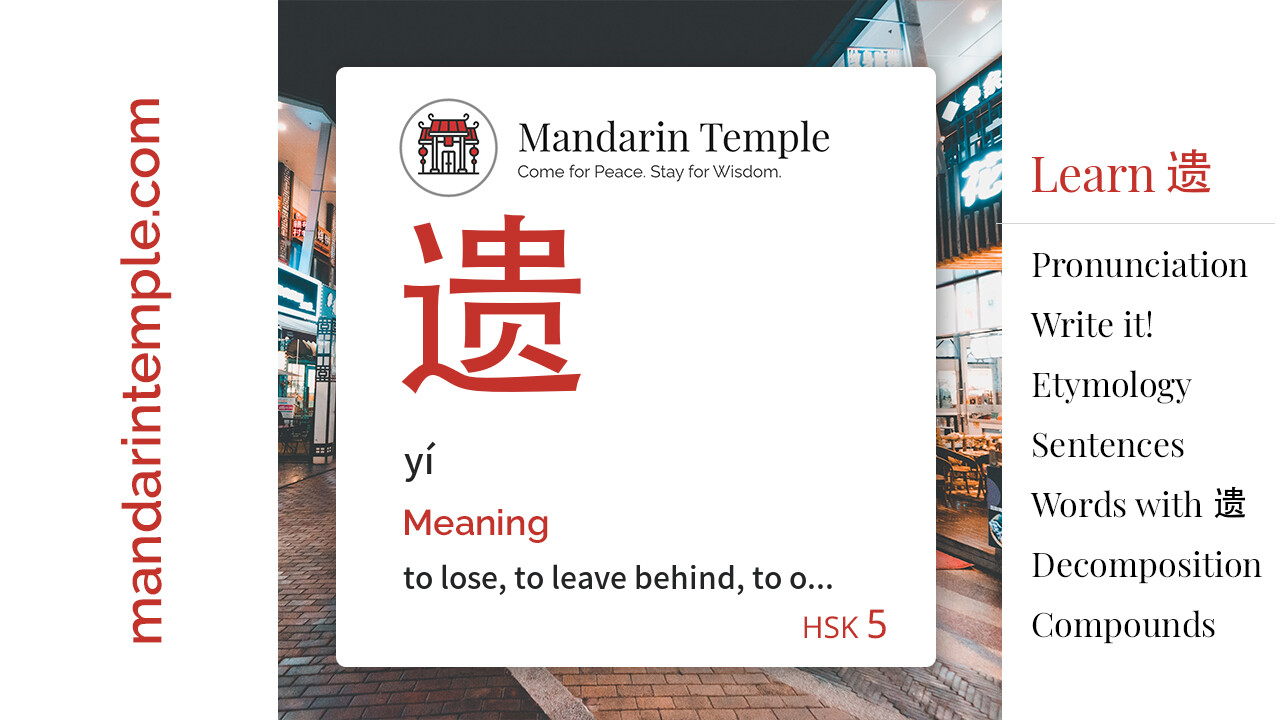Pronunciation
遗 yí
To complete this step you need to listen to the audio pronunciation of the word once.
遗 yí Meaning
Learn the Pinyin Pronunciation and 7 English Translations of the word 遗 yí .
To complete this step you need to read and scroll down.
- Pīnyīn Pronunciation
- yí | yi2
- English translation
- to lose
- to leave behind
- to omit
- to bequeath
- sth lost
- involuntary discharge (of urine etc)
- to lose; a lost article
Learn the Chinese word 遗 yí in 8 easy steps:
Type
ideographicPositional decomposition
⿺辶贵Write it!
Practice your Chinese writing skills and learn precisely where and when to draw every stroke of the
Chinese word 遗 yí .
Press the Show Strokes button to see the strokes and their order and hit Start Drawing when you are
ready to practice.
To complete this step you need to write the word once.
Spread the word
“Do the difficult things while they are easy and do the great things while they are small. A journey of a thousand miles must begin with a single step.”
Lao Tzu Tweet
Example sentences using 遗 yí
Broaden your vocabulary by interacting with 5 audio-assisted sentences using the Chinese word 遗 yí in different contexts.
To complete this step you need to listen to each of the five Chinese sentences at least once. and scroll down.
Words with 遗 yí
Explore 25 words and sayings that include the Chinese character 遗 yí in their composition.
To complete this step you need to read and scroll down.
| Frequency | Simplified | Meaning | Traditional |
|---|---|---|---|
| 遗憾 yíhàn | regret | 遺憾 | |
| 遗产 yíchǎn | heritage | 遺產 | |
| 遗传 yíchuán | heredity | 遺傳 | |
| 遗忘 yí wàng | to forget | 遺忘 | |
| 遗嘱 yí zhǔ | will | 遺囑 | |
| 遗体 yí tǐ | remains (of a dead person) | 遺體 | |
| 遗址 yí zhǐ | ruins | 遺址 | |
| 遗漏 yí lòu | to overlook | 遺漏 | |
| 遗弃 yí qì | to leave | 遺棄 | |
| 遗失 yíshī | to lose | 遺失 | |
| 遗留 yíliú | to leave behind | 遺留 | |
| 遗 yí | to lose | 遺 yí | |
| 遗书 yí shū | testament | 遺書 | |
| 遗言 yí yán | words of the deceased | 遺言 | |
| 后遗症 hòu yí zhèng | (medicine) sequelae | 後遺症 | |
| 遗迹 yí jì | trace | 遺跡 | |
| 遗物 yí wù | remnant | 遺物 | |
| 不遗余力 bù yí yú lì | to spare no pains or effort (idiom); to do one's utmost | 不遺餘力 | |
| 遗孀 yí shuāng | widow | 遺孀 | |
| 遗愿 yí yuàn | final wishes of the departed | 遺願 | |
| 遗传学 yí chuán xué | genetics | 遺傳學 | |
| 遗骸 yí hái | (dead) human remains | 遺骸 | |
| 无遗 wú yí | fully | 無遺 | |
| 遗传性 yí chuán xìng | hereditary | 遺傳性 | |
| 遗骨 yí gǔ | (dead) human remains | 遺骨 |
AMAZON BOOKSHELF
AMAZON BOOKSHELF
